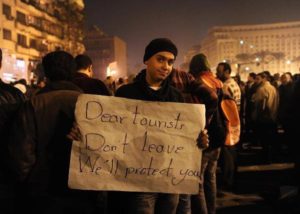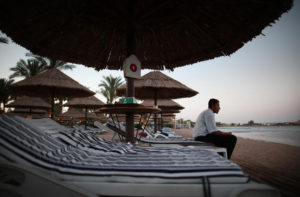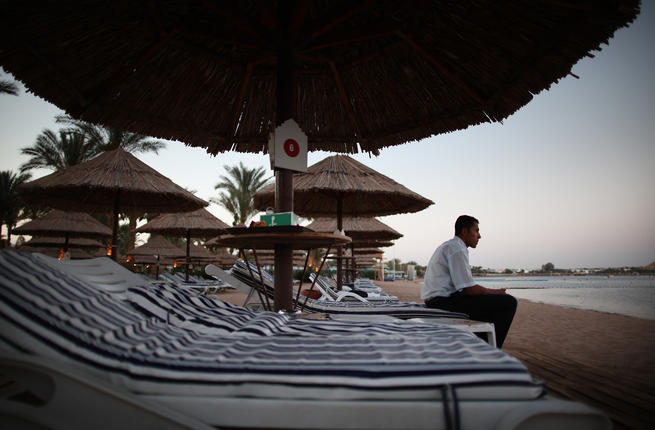
Five years after the Thawra and Egypt’s once-flagship tourism industry can’t seem to catch a break. Just when the numbers look like they’re picking back up, something ludicrous happens, like a bunch of foreign tourists getting gunned down on accident.
These days, domestic travel is being shoved down our throats by “influencers” and there seems to be a new hotel opening every few months, yet formerly booming resort cities have been reduced to ghost towns and occupancy rates remain abysmal.
Last week, the official Egyptian statistics body CAPMAS reported that, for the fifth month in a row, tourism was down in March 2016, plunging 47.2% compared to the same time period last year.
 After Daesh downed a Russian plane in Sinai last October and all 224 souls on board were killed, Russian trips to Egypt screeched to a halt along with flights to Sharm El Sheikh from other countries. In January, Egyptian Prime Minister Sherif Ismail said that the country had lost $1.2 or $1.3 billion in revenues due to the tragedy.
After Daesh downed a Russian plane in Sinai last October and all 224 souls on board were killed, Russian trips to Egypt screeched to a halt along with flights to Sharm El Sheikh from other countries. In January, Egyptian Prime Minister Sherif Ismail said that the country had lost $1.2 or $1.3 billion in revenues due to the tragedy.
What followed was a series of aviation disasters that could have taken place only in Egypt: a lovesick hijacking in March that made the country the butt of an international joke; a four-day work slowdown last week by EgyptAir pilots protesting for a raise in salaries and better working conditions that resulted in flight delays and cancellations; and now, a Cairo-bound plane (which took off from a still-mourning Paris) suspiciously disappears from radar screens and crashes into the refugee-laden waters of the Mediterannean.
Somewhere in there (and keep in mind we’re not even halfway through the year), Egypt appointed a new tourism minister who is weirdly optimistic, telling Reuters that, “We care big time about human rights.”
The truth is, no matter how many “Egypt is safe” billboards go up in Times Square, Egypt faces unstable political realities and economic woes that not even a glossy $68 million advertising contract can mask with silver-lining hashtags and pretty pictures.
The once-overwhelming popularity of Egypt’s head of state is cracking under the pressures of a devalued Egyptian pound and a crippling dollar shortage — a direct result of the tourism crisis coupled with an absence of international investments.
 And what to do the cracks reveal? Mounting popular dissatisfaction (most recently over the “sale” of two Red Sea islands to its Saudi neighbors), international condemnation over arbitrary arrests and human rights abuses (most recently over the torture and murder of an Italian student studying in Cairo) and a fearful regime that mistakes the social media satire of teenagers as sympathy towards an extremist insurgency that threatens its very bread and butter: tourism. A self-fulfilling vicious cycle of WTF.
And what to do the cracks reveal? Mounting popular dissatisfaction (most recently over the “sale” of two Red Sea islands to its Saudi neighbors), international condemnation over arbitrary arrests and human rights abuses (most recently over the torture and murder of an Italian student studying in Cairo) and a fearful regime that mistakes the social media satire of teenagers as sympathy towards an extremist insurgency that threatens its very bread and butter: tourism. A self-fulfilling vicious cycle of WTF.
Meanwhile, flights and hotels remain empty compared to Egyptian tourism’s pre-revolutionary heyday. In order to reach its target of attracting 12 million visitors by the end of 2017, the Ministry of Tourism is focusing more on markets like China, Malaysia and the GCC to fill the gaps left by missing European tourists.
But if Egypt is to meet its tourism goals, it cannot continue to insist that the industry is divorced from the political realities of the country, as if tourism exists in a magic bubble — because the last several years have proven that it doesn’t. That bubble keeps getting popped by one public-relations disaster after another, from overt terrorist attacks to the defensive policies of a regime under threat.
No matter how many bandages are used to cover up the gaping wound that is Egypt’s tourism industry, the fact is that it is still a gaping wound. Five years after the Thawra, is it getting any closer to healing?
WE SAID THIS: Don’t miss 22 Pictures That Prove Why Luxor Is 2016’s Tourism Capital of the World.



